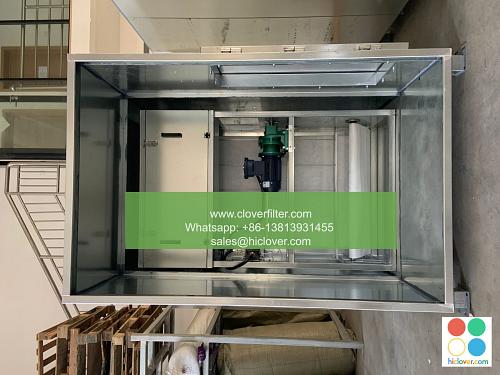Cleanroom Technology: The Role of Automatic Roll Air Filters in Medical Electronics

Cleanroom technology is a crucial aspect of various industries, including medical electronics, where the control of airborne particles is essential to prevent contamination and ensure the quality of products. In these environments, air filtration systems play a vital role in maintaining the required level of cleanliness. One of the key components of these systems is automatic roll air filters, which have become an indispensable tool in the medical electronics industry. In this article, we will delve into the world of cleanroom technology, exploring the importance of automatic roll air filters in medical electronics and their benefits.
In medical electronics, the manufacturing process involves the production of highly sensitive and intricate components, such as implantable devices, medical implants, and diagnostic equipment. These products require a controlled environment to prevent contamination from airborne particles, which can compromise their quality and functionality. Cleanrooms provide such an environment, with strict control over temperature, humidity, and air quality. The air filtration system is a critical component of the cleanroom, responsible for removing airborne particles and maintaining the required level of cleanliness.
Automatic roll air filters are designed to provide a high level of filtration efficiency, capturing particles as small as 0.3 microns. These filters are made of a continuous roll of filter media, which is automatically advanced as the filter becomes loaded with particles. This design ensures that the filter always operates at peak efficiency, providing a consistent level of cleanliness in the cleanroom. The automatic roll air filter is typically installed in the air handling unit or the ceiling of the cleanroom, where it can effectively capture airborne particles before they enter the work area.
The benefits of automatic roll air filters in medical electronics are numerous. Firstly, they provide a high level of filtration efficiency, which is essential for preventing contamination and ensuring the quality of products. Secondly, they are designed to minimize maintenance and operating costs, as the filter media is automatically advanced and replaced as needed. This design also ensures that the filter is always operating at peak efficiency, reducing the risk of contamination and product defects. Finally, automatic roll air filters are designed to provide a long service life, reducing the need for frequent replacements and minimizing waste.
In addition to their technical benefits, automatic roll air filters also play a critical role in ensuring compliance with regulatory requirements. In the medical electronics industry, manufacturers must comply with strict regulations and standards, such as ISO 13485 and FDA guidelines. Automatic roll air filters can help manufacturers meet these requirements by providing a consistent level of cleanliness and minimizing the risk of contamination. By investing in automatic roll air filters, manufacturers can demonstrate their commitment to quality and compliance, which is essential for building trust with customers and regulatory authorities.
Another important aspect of automatic roll air filters is their flexibility and adaptability. They can be designed to meet the specific needs of different cleanroom applications, including medical electronics, pharmaceuticals, and biotechnology. They can also be integrated with other cleanroom systems, such as heating, ventilation, and air conditioning (HVAC) systems, to provide a comprehensive and controlled environment. This flexibility and adaptability make automatic roll air filters an essential tool in the medical electronics industry, where manufacturers must be able to respond quickly to changing regulatory requirements and customer needs.
In conclusion, automatic roll air filters play a vital role in cleanroom technology, particularly in the medical electronics industry. They provide a high level of filtration efficiency, minimize maintenance and operating costs, and ensure compliance with regulatory requirements. Their flexibility and adaptability make them an essential tool in the industry, where manufacturers must be able to respond quickly to changing needs and requirements. By investing in automatic roll air filters, manufacturers can demonstrate their commitment to quality and compliance, which is essential for building trust with customers and regulatory authorities.
FAQs
Q: What is the main purpose of automatic roll air filters in cleanroom technology?
A: The main purpose of automatic roll air filters is to provide a high level of filtration efficiency, capturing airborne particles and maintaining the required level of cleanliness in the cleanroom.
Q: How do automatic roll air filters benefit the medical electronics industry?
A: Automatic roll air filters benefit the medical electronics industry by providing a high level of filtration efficiency, minimizing maintenance and operating costs, and ensuring compliance with regulatory requirements.
Q: Can automatic roll air filters be designed to meet the specific needs of different cleanroom applications?
A: Yes, automatic roll air filters can be designed to meet the specific needs of different cleanroom applications, including medical electronics, pharmaceuticals, and biotechnology.
Q: How do automatic roll air filters ensure compliance with regulatory requirements?
A: Automatic roll air filters ensure compliance with regulatory requirements by providing a consistent level of cleanliness and minimizing the risk of contamination, which is essential for meeting strict regulations and standards in the medical electronics industry.

